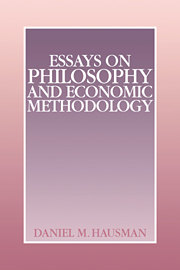Book contents
- Frontmatter
- Contents
- Introduction: What is philosophy of economics?
- PART I METHODOLOGY AND THEORY APPRAISAL
- PART II CAUSALITY IN ECONOMICS
- 9 Are there causal relations among dependent variables?
- 10 Classical wage theory and the causal complications of explaining distribution
- 11 Supply and demand explanations and their ceteris paribus clauses
- PART III CASES AND PUZZLES
- PART IV POSTSCRIPTS
- Bibliography of relevant writings by Daniel M. Hausman
- Bibliography of works by other authors
- Index
11 - Supply and demand explanations and their ceteris paribus clauses
Published online by Cambridge University Press: 05 June 2012
- Frontmatter
- Contents
- Introduction: What is philosophy of economics?
- PART I METHODOLOGY AND THEORY APPRAISAL
- PART II CAUSALITY IN ECONOMICS
- 9 Are there causal relations among dependent variables?
- 10 Classical wage theory and the causal complications of explaining distribution
- 11 Supply and demand explanations and their ceteris paribus clauses
- PART III CASES AND PUZZLES
- PART IV POSTSCRIPTS
- Bibliography of relevant writings by Daniel M. Hausman
- Bibliography of works by other authors
- Index
Summary
This paper argues that supply and demand explanations are causal explanations and that it is helpful to recognize this fact explicitly, for then one can appreciate that the variables impounded in the ceteris paribus clauses attached to supply and demand curves are other causes. One can then specify clearly the conditions of membership of a ceteris paribus clause: 1) include all those factors that within the given time period significantly affect the amount supplied or demanded but; 2) do not include any factors that themselves within the given time period significantly depend on the price of the particular commodity or service. Note the vague word “significantly.” If one insists on the general interdependencies established in general equilibrium analyses, one must reject partial equilibrium analyses altogether, but to do so would rule out work that may be enlightening and useful. Such theoretical purism is also indefensible, since general equilibrium analyses rely on similar causal approximations. This analysis of ceteris paribus clauses is helpful in understanding where supply and demand analysis or comparative statics goes wrong, as in traditional functional distribution theory.
A severe frost cut Brazilian coffee output in 1976 to less than one-third of its previous level. During 1976 coffee prices were much higher. The simple and relatively uncontroversial explanation is that buyers competing with one another for the decreased supply of coffee bid up its price.
- Type
- Chapter
- Information
- Essays on Philosophy and Economic Methodology , pp. 147 - 162Publisher: Cambridge University PressPrint publication year: 1992



